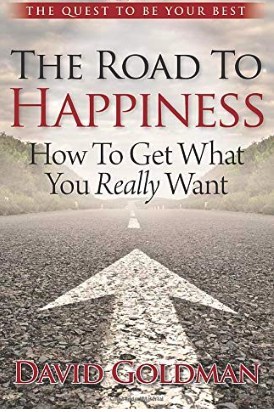PITTSBURGH, Dec. 4, 2019 /PRNewswire/ — As a professional, you probably don’t think of yourself as a salesperson, but you need to enroll clients.
“In fact, for professionals, sales is really just an enrollment process,” says David Goldman, author of The Road To Happiness: How to Get What You Really Want (2020, www.indiebooksintl.com).

Since November 1989, Goldman has worked with professionals (accountants, attorneys, and financial advisors) who want to bring in more business, and executives who want to be more effective and move up in their organizations. He consults, coaches, and teaches them to communicate more effectively so that they get the results they really want.
“Sales is certainly a bad word for many professionals, so they refer to it as client development or business development,” says Goldman. “When you are at your best, you aren’t selling anything or anyone. At your best, you enroll someone into the possibility that your product or service is for them.”
The following five-step Goldman Enrollment Process is excerpted from Goldman’s book:
Step 1. There must be some background of relationship. Some rapport must be established. This doesn’t have to be elaborate, nor does it have to take a great deal of time. Without it, however, nothing will go further. It could be an introduction or a referral from someone else. You can establish rapport with a simple question. Ask, “What was it that made you want to meet with me today?” Then listen.
Step 2. A conversation for possibility is the most important part of the process. The entire deal hinges on this piece. Once there is a relationship, possibility is the most important part of the process. The conversation for possibility is simply establishing the possibility that your product or service could be for the client or prospect. This is where the entire reason for your service is brought to light, in complete detail. Here’s the key: the possibility must come from the prospect/client, not you. You must get them to talk about it. For instance, you might inquire, “What would you want to get from this process?” or “Why are you here and what do you really want?” Then, no matter what they say in response, you ask for greater understanding. Then you say, “What else?” Keep saying, “What else?” until the other person says, “That’s about it.” Remember, the entire list of things that they want must come from them—not you.
Step 3. The conversation for value must also come from the prospect or client. You say, “Let’s suppose that I can help you make all of the things on your list happen. What would the value of that be, in real terms, in your life?” In the enrollment process, do not accept “I don’t know.” Simply say, “I realize that it’s not an easy question. However, take a look. What would it be worth to you?” Be prepared for fuzzy, vague, general answers. You must stay focused on getting a real number that represents what the prospect thinks the value of your product or service would be. Do not browbeat or become aggressive; hang in there and get an answer. It will help you when it’s time to seal the deal.
Step 4. Now you get to talk about the opportunity, which is your program or service. And now you can be more focused than you have ever been. You can tailor what you have to say based on what the client is looking for. This is not meant to be manipulative in any way. If your service is not what the client is looking for, simply say so and refer someone else to the client and move on. You explain how your service works (the elements and the logistics.) Don’t overdo it. Remember, less is more.
Step 5. The final step is the call to action. No matter how smoothly the rest of the process goes, you still must ask for the business. Goldman usually says, “I’m not a great salesperson. I only have one close, and I usually tell you when it’s coming—pretty soon. First, do you have any questions?” Answer any questions they might have, and then simply ask, “Does this make sense? Are you ready to proceed?” Or, “Here’s the next step; when do you want to start?”
Goldman’s book is filled with true stories to illustrate the concepts that lead to results and happiness. “My mission is to have people get what they really want and be happy. Because happy people do not hurt other people.”
About Indie Books International
Indie Books International (www.indiebooksintl.com) was founded in 2014 in Oceanside, California by two best-selling business authors. Since then the company has released more than 125 titles. Similar to indie film companies and indie music labels, the mission of Indie Books International is to serve as an independent publishing alternative for business thought leaders.
Media Contact:
Henry DeVries
230367@email4pr.com
619-540-3031
SOURCE Indie Books International
